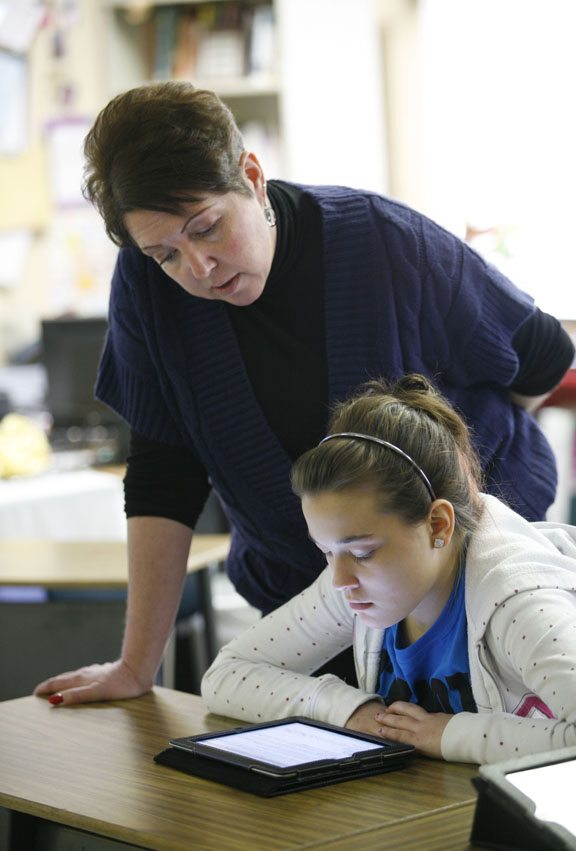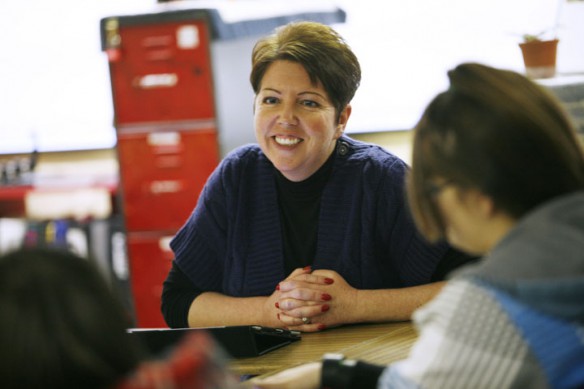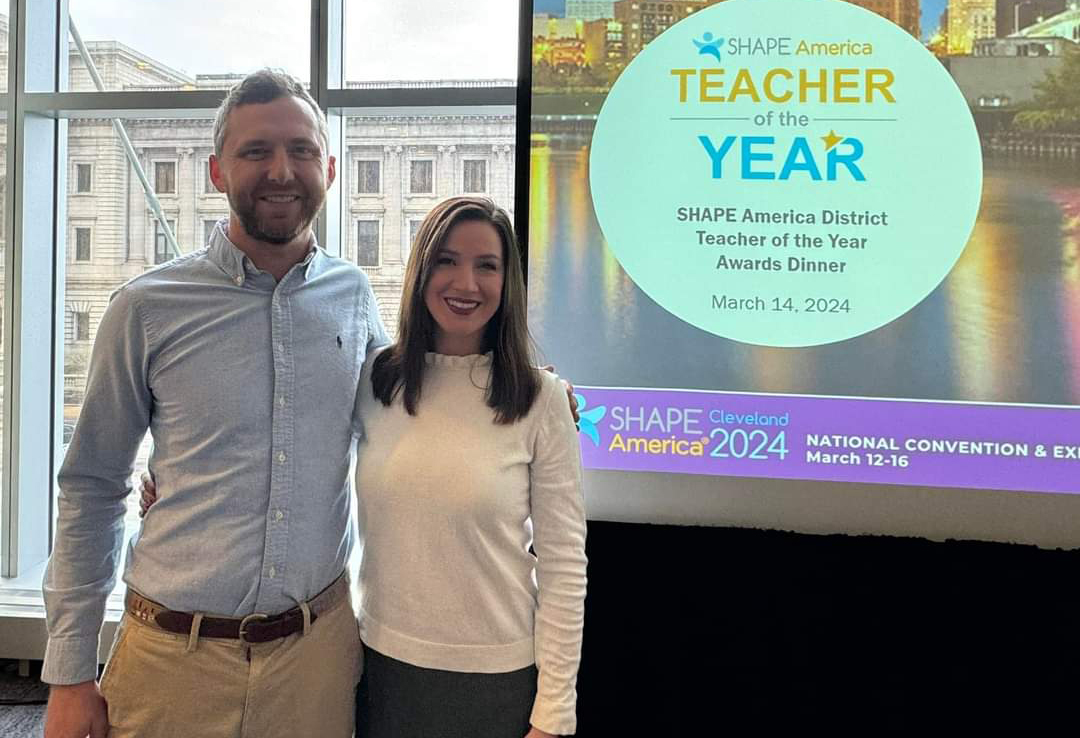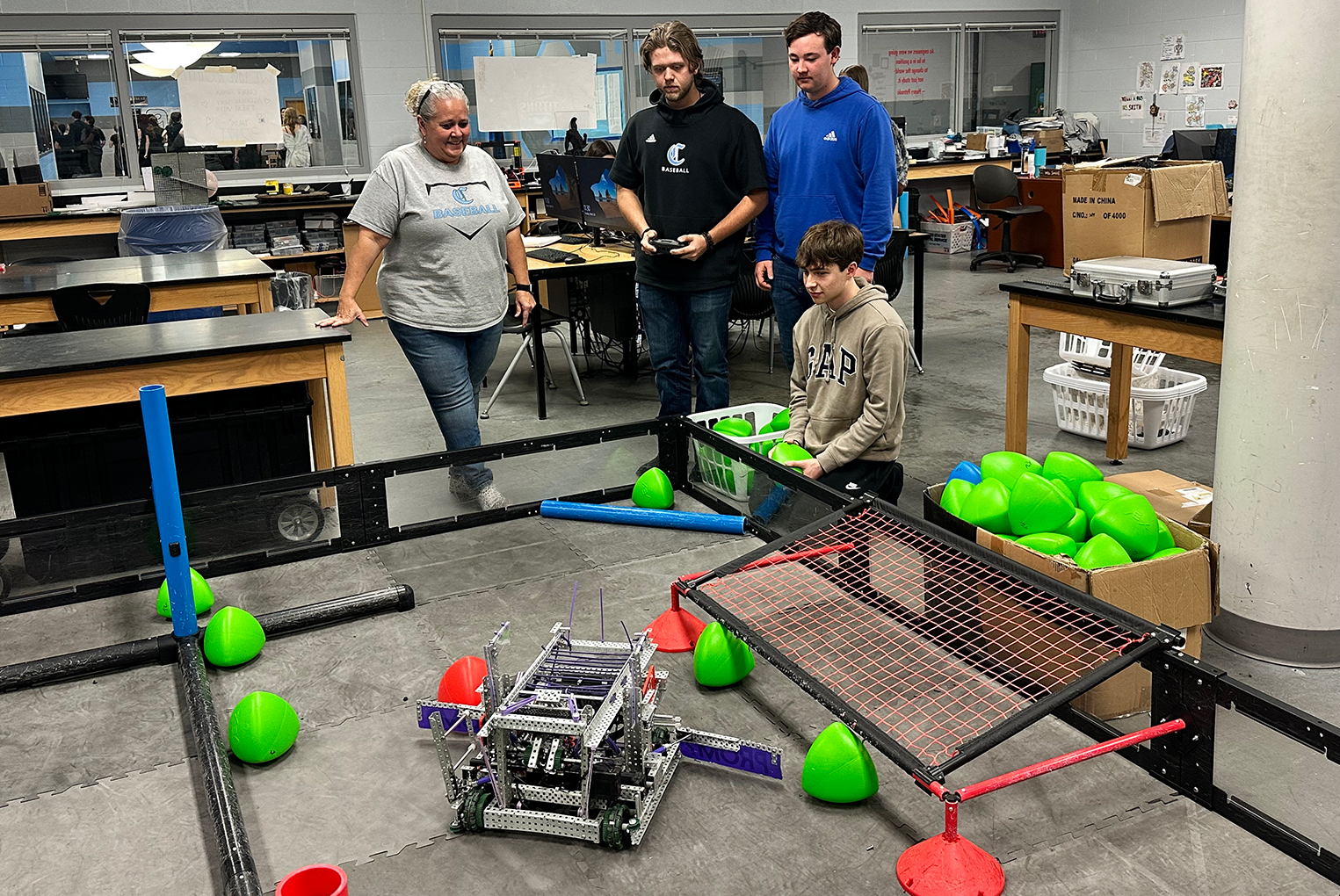
National Board Certified Teacher Joyce Bruner helps 8th-grade student Sarah Cilinceon work on her digital driver’s license at The Providence School (Jessamine County). Photo by Amy Wallot, Jan. 26, 2012
By Matthew Tungate
Middle school social studies teacher Joyce Bruner has had her students undertake some pretty deep assignments. For example, they have:
- analyzed the relationships among geography, economy, culture and resources in early American history and today in order to determine how technological advances alter those relationships
- applied the Department of Defense’s current definition of terrorism to the beliefs/actions of an explorer during the Era of Exploration in the Americas to drew conclusions about why “terrorism” is defined differently from various perspectives in a global society
- analyzed a piece of artwork inspired by the events leading to the Revolutionary War to see how an artist can elicit an emotional response from the audience
So it may not be that surprising that Bruner was one of 289 Kentucky teachers to earn National Board Certification last year. What may surprise some is that Bruner teaches at The Providence School (TPS), an alternative school in Jessamine County.
Bruner, who taught in traditional schools for more than a decade, has been at TPS since it opened in 2001 and said she prefers the alternative.
“The compelling reason that I chose to move to Providence was because I have always had a heart for the at-risk child. In my classes at the traditional school, there were ‘lost’ children. Day after day I would promise myself, ‘Tomorrow. Tomorrow is the day that I will find time to sit down with that child and help him understand,’” she said. “With 30-plus students in a class, that day never seemed to come. Those lost faces haunted me at night. At Providence, I can give students the time they need so that the ‘lost’ look becomes one of understanding followed by a desire to learn more.”
That’s because TPS has a middle school teacher-student ratio of 8:1, she said.
“This ratio allows me to give my students personalized instruction and more meaningful differentiation than I was able to manage in the traditional classroom,” Bruner said.
Bruner teaches students in 6th-, 7th- and 8th-grade social studies, so she said she also has the benefit of getting to “really know my students and their families.”
Sherri Clusky, staff assistant for the Kentucky Department of Education’s Division of District 180 and a former director of an alternative program in Pike County, said 149 of 174 districts have some sort of alternative program. While Bruner is not the only National Board Certified Teacher (NBCT) at an alternative school, she is certainly the exception, not the rule.
Some districts still have a “dumping ground” mentality and see alternative programs as a place to “put the bad kids,” Clusky said.
“I think the mindset has to change of what an alternative program means to a district, from the superintendent all the way down,” she said. “I just think that mindset has to be there that this is a place to help kids achieve to their highest potential.”
The state Department of Education is working hard to change that perception, and seeing more NBCTs in them is a good way to do so, Clusky said.
“These are the students that need the most. So if they have excellent teachers, teachers that are National Board Certified, they can lift those students up,” she said. “A lot of students that are in alternative programs have lower reading levels, so you want your best teachers with those students in order to raise those students up.”
The National Board certification process requires a teacher undertake intense self-reflection and analysis of his or her teaching practice. That self-examination includes a three-hour written test, two videotapes demonstrating classroom teaching skills, and a portfolio that includes descriptions of a candidate’s school and community involvement, sample lesson plans and analysis of students’ work.
In Kentucky, a teacher is eligible to receive his or her Rank I degree when passing National Board certification.
NBCTs also are eligible for a $2,000 salary supplement for the life of the certificate (it must be renewed after 10 years). They also are employed or mentoring in their certificate area for at least 50 percent of the time.
“I think that any time a teacher does such a deliberate analysis of his or her practice, that brings change for the better,” Bruner said.
She also said TPS is just as likely as a traditional school to have NBCTs, if not more so.
“At TPS we have the same high expectations for rigor and achievement that one will find at any school in Jessamine County,” she said. “Students and teachers are held accountable for high levels of performance.”
The Providence School’s principal, Denise Adams, said district officials had many discussions about the mission of the school, how it had to be different from traditional schools if it were going to succeed in educating Jessamine County’s at-risk students and how the programming had to differ from traditional offerings.
They decided to focus on the “whole child” and how the school’s culture had to support the integration of every aspect of students’ lives – including academics.
“The culture at TPS has increasingly expected more from adults and students, and Mrs. Bruner is a cultural leader in our school,” Adams said. “When I learned she was pursuing this certification, I was surprised – but only for a couple of minutes. Very quickly, I realized how congruent her decision to pursue NBC was with everything else I knew about her.”
“I think this process validates the expertise of alternative school teachers and legitimizes the education we are providing to alternative students in a manner valued by all educators,” she added. “As good a teacher as Mrs. Bruner was before the NBC process, she is even better now. Even if a teacher doesn’t achieve certification, the learning from the process would improve any teacher’s instructional practices.”
Travis Spann is a special educator and the middle school math teacher. He is in his third year teaching, all at TPS. However, he spent two years substitute teaching in traditional schools, and he said The Providence School is no different in its approach to academic excellence.
“While our therapeutic emphasis is primary, our focus on academic achievement is by no means neglected. We believe that our unswerving dedication to the students themselves naturally results in higher academic achievement,” he said. “We teach from the same standards as traditional schools, and our goal is to see all students excelling in their ability to grasp and utilize the prescribed content.”
Bruner said that all of the teachers at TPS meet the five “Core Propositions” of National Board Certification.
“Without exception, teachers are at Providence by choice because we feel that this is where we are supposed to be,” she said. “Throughout our school, expectations are high and best practice is the norm. We are never happy with the status quo; we constantly strive to serve our kids better.”

National Board Certified Teacher Joyce Bruner talks with 8th-grade students at The Providence School (Jessamine County). Photo by Amy Wallot, Jan. 26, 2012
Bruner is a prime example of that, Adams said.
“She is consistently well-prepared to deliver instruction, and she is uniquely gifted at engaging students in the content,” she said. “Students in her classes are thinking constantly.”
Spann said Bruner does the most important thing he can think of – show students that she cares.
“Mrs. Bruner does this every day in her interactions with students, laughing with them, taking time to listen to them personally, celebrating their achievements, holding them accountable for their behaviors and treating them with dignity and respect,” he said. “I have seen on numerous occasions how she has given up her planning period to talk with students who needed someone to listen to them and care for them.”
“She has given her heart to her students and to her role as public educator,” he said. “She gives it all in the classroom and outside of the classroom in research, planning and preparation.”
He also called Bruner “a selfless pioneer in our middle school.”
Spann and Adams both noted how Bruner found a private donor to provide iPads for her and her students this year.
“This year Mrs. Bruner has been nearly paperless as students are electronically submitting their work,” Adams said. “We have observed students stay engaged throughout class as they always have a ‘work folder’ that is differentiated for them. Absent students are logging on and submitting work electronically.”
But she didn’t stop there, Spann said.
“She worked tirelessly to draw up a presentation for our school administration and district superintendent, researching in various places and consulting with knowledgeable sources,” he said. “Her diligence paid off, and now our middle school is preparing to surge forward into brand new territory. We are the iPad pilot for the entire district thanks to Mrs. Bruner’s leadership and determination to provide the best for our students.”
Bruner said the iPad project is not about the technology as much as it is about access to people, resources and places that would otherwise be out of reach for students.
“Our vision is that teachers will become facilitators as students pursue a life vision and take control of their own learning in a culture of differentiated engagement,” she said. “Over the next year, we will work together with students to change of the face of teaching and learning as we know it.”
Spann said he is not sure if he will seek NBCT status, but he is proud of Bruner’s success and proud to be her colleague.
“I am inspired to give more of my heart to best serve our students,” he said. “Bottom line: Joyce Bruner has encouraged us all to strive for excellence at The Providence School.”



Leave A Comment